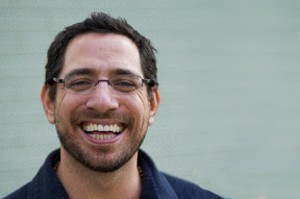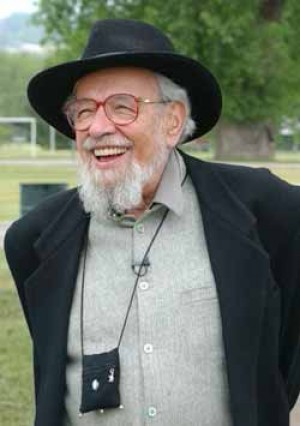Rabbi David Ingber of Romemu discusses the future of Jewish Renewal
I first interviewed David Ingber, the charismatic rabbi at Romemu, at the gathering of Jewish Renewal rabbis in St. Louis. Ingber impressed me both by the power of his davenning and by his passionate commitment to Jewish Renewal as a movement. Jewish Renewal is undergoing a seismic shift, as its beloved Rebbe, Zalman Schachter-Shalomi, prepares for his departure from this world. In an article for the Forward, I probe why Renewal, facing this shift, refuses to consider itself a denomination. Here, I follow-up with Ingber, in a conversation I allowed him to edit.—Jo Ellen Green Kaiser
Zeek: Why did you become a Renewal rabbi? You have enough learning to have become a rabbi in any denomination. And many of the denominations are pretty flexible now. You are coming to the rabbinate relatively early in your life. Why Renewal?
Ingber: What Renewal offered me began with Reb Zalman. Reb Zalman stood as a living example of someone who gave me permission to integrate various selves into a coherent whole. I had been raised in a modern Orthodox milieu, turned to ultra-Orthodoxy in my late teens and early twenties, left Judaism and practiced Eastern traditions for almost a decade and then returned to yiddishkeit. When I ‘came back’ I had many ‘spiritual’ experiences and contexts that seemed irreconcilable with the Judaism I had left behind. Reb Zalman opened me to a possibility of integration, to what may be called an Integral Judaism.
An Integral Judaism would incorporate as many truths as it can from the various denominational platforms, within a whole that is greater than its parts. In addition to critical approaches to text, it would offer mystical practices that open the heart and mind to an experience of the Divine. It would offer a more comprehensive approach to practicing and experiencing Jewish life.
Right now, I am not sure there is any other movement that has an integral approach to Judaism, that incorporates all levels of consciousness from waking to sleeping, that acknowledges and holds the rational and the transrational, the pre-modern and the post-modern truths, that is at once historical and a-historical, that concerns itself with practices that alter our state of consciousness itself—there is no Jewish movement willing to address all of that, at its core, except Renewal.
In addition, Renewal is uniquely positioned to be the bridge between Judaism and the larger spiritual culture. It’s a way to bring the unaffiliated back to Judaism. It’s where innovation is.
Zeek: What do you mean by innovation?
Ingber: Innovation with a siddur means that you use it, as Reb Zalman says, like a recipe book. In most synagogues, prayer life means ‘eating’ the siddur, getting through it, or just adding a melody to ‘spice’ words that often feel devoid of meaning. When you lead a prayer, we don’t need to read the prayer to get the meaning of the prayer: you can use a niggun, you can use fewer words, you can use kavanot (intentions, pointing instructions).Innovative is doing more devotional English and using visualizations. Innovation is doing a meta-meditation (Buddhist style). Innovative prayer means thinking about the ends you want to achieve and using your means to get there.
That kind of innovation specifically, is not happening in Orthodoxy, that’s for sure. Conservative Judaism is struggling with the question of when and how to innovate, they aren’t ready or willing to push it. And Reconstruction–when they want to do innovative spiritual stuff, they end up doing Renewal. In general, in the other movements, when you see spiritual innovation, they often learned it from someone in Renewal first. Renewal has become the spice of choice for twenty-first century Jews, often without even knowing it came from Renewal.
Zeek: That may be, but we are talking here at Ohalah, the gathering of Renewal rabbis, and I don’t see very many young people.
Ingber: Renewal has not been able to transfer the passion of previous generations to the next generation yet. We are not competing in the marketplace and that seems to be a perennially vexing question for us. Part of that speaks to the question, What is Renewal? What makes Renewal unique?
I think we need to redefine ourselves: the quasi-movement definition that’s attached to Renewal can be a blessing and a curse. Reb Zalman has often said that when something becomes a “movement” it ironically stops moving. That is true enough. The dangers of institutionalization are immense. The other side of that equation is valid as well: It hard to ‘see’ something that refuses being pinned down.
Zeek: Do you think Renewal should be a denomination?
Ingber: I am not sure how others feel, or what our official policy is, but I think Renewal is a denomination. But we may need to redefine what it means to be a denomination. Look, is Chassidut a denomination or a movement? I often think of Renewal as a neo-chassidic expression to which Reconstructionism is the neo-mitnaggdim.
Renewal has clear principles and beliefs, practices and approaches. We will continue to articulate and clarify who we are and what we believe as the next generation of Renewal carries the message forward.
Younger people think concretely—they want to know what we stand for, what we do, what’s our position on conversion, on Shabbat, on mitzvot, on halakah? To some degree, Renewal suffers from being a post-modern expression, wary of pronouncing big truth statements while living with a mature understanding of how uniquely each of us lives with G-d, Torah and the world.
Zeek: There’s also the fact that some young people are drawn to the rebbe model, but others are anti-authoritarian. When you come into a Renewal situation, like Ohalah, everyone talks about Reb Zalman this, or Reb Zalman that. If you mention that Renewal seems very much based on Reb Zalman, they say, no, Reb Zalman has consciously held himself back and now we are lead by Reb Zalman’s spiritual grandchildren. Well, to an outsider, that’s still the rebbe model, it’s still lineage.
Ingber: Yes, Reb Zalman has had a core group of students. It is true that there is a strong sense of charismatic leaderhip in this movement. And it is true, that Reb Zalman has an enormous presence. A teacher like Reb Zalman comes along once in a lifetime. Personally, as one of his students, I feel that Reb Zalman is a beautiful example of a leadership model that incorporates top/down approach with a more heterarchical one. There is room for leaders with charisma AND creating an environment that supports a more grassroots, do-it-yourself approach. Again, there is maturity involved in embracing both aspects of this tension.
Zeek: How do you maintain the legacy of someone like a Reb Zalman? How do you keep Renewal—as movement or denomination—alive?
My personal dream is to bring an institution, a center for Renewal, to New York City.
I know Reb Zalman is afraid of creating an institution. I don’t see any other way for it to be sustainable. Maybe Reb Zalman would prefer it not to be sustainable than to succumb to some of the illnesses of a denomination but…
Zeek: This happened to many people involved in the movements of the Sixties. They developed the idea then that institutions were dangerous and when some of the new institutions that did arise from the Sixties became more conservative in the Seventies and Eighties, these radicals felt affirmed in their fear of institutions. It’s only now, with a group that grew up after the Sixties, that we see new ways of thinking about what institutions can be, so we don’t have those problems. For example, the initiatives to create institutions that are grassroots, horizontal, but those models haven’t been tested.
Ingber: Again, I think there is room for flexible leadership, for what some call hol-archy. This is consistent with Reb Zalman’s entire approach, and frankly that of Renewal leadership as I know it. Renewal is brilliant at holding the vertical and the horizontal, charismatic leadership with grassroots involvement.
Zeek: To be a denomination, you have to know who you are and what you believe. I asked the Ohalah board “What is Renewal?” and they couldn’t give me one answer.
Ingber: Renewal is many things and contains multitudes. We are a post-triumphalist, post-modern, liberal, progressive, egalitarian, mystical, psycho-spiritual, pan-halachic, movement, that seeks to integrate and honor body, heart, mind, and spirit, East and West pre-critical and post-critical, individual and communal, mythic and post-mythic, masculine and feminine, silence and ecstatic under one, large, HUGE umbrella called Renewal Judaism.
For me, Renewal is the tip of the dreidle whose sides are Orthodoxy, Conservativism, Reform, and Reconstruction—what Renewal can do is integrate these various perspectives. I don’t want to leave any part of myself out of my spiritual life.
Zeek: Thank you.
![[the current issue of ZEEK]](../../image/2/100/0/5/uploads/leftistethicistgraphic-52842c6a.png)
- 5000 Pages of Zeek
- Founded in 2001, Zeek was the first Jewish online magazine, and we have over 5000 pages online to prove it, all available free of charge. Read more in the Archive.
More articles by
- We're on Hiatus!
- Euphoria, Curiosity, Exile & the Ongoing Journey of a Hasidic Rebel: A Q & A with Shulem Deen
- Purim’s Power: Despite the Consequences –The Jewish Push for LGBT Rights, Part 3
- Love Sustains: How My Everyday Practices Make My Everyday Activism Possible
- Poet Q, Poet A: Jews Are Funny! Six Poets on Jewish Humor, Poetry & Activism and Survival
More articles in
Faith and Practice
- To-Do List for the Social Justice Movement: Cultivate Compassion, Emphasize Connections & Mourn Losses (Don’t Just Celebrate Triumphs)
- Inside the Looking Glass: Writing My Way Through Two Very Different Jewish Journeys
- What Is Mine? Finding Humbleness, Not Entitlement, in Shmita
- Engaging With the Days of Awe: A Personal Writing Ritual in Five Questions
- The Internet Confessional Goes to the Goats



